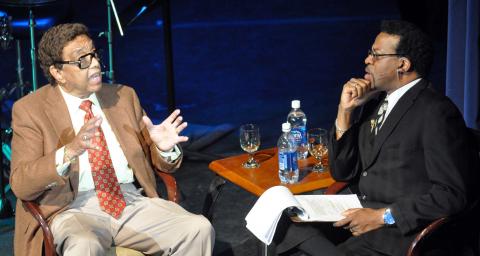A Vision for Africana Studies/Black Music Culture at Berklee

Jazz educator/pianist Billy Taylor (left) shared insights with William Banfield during Taylor’s February visit to Berklee.
Phil Farnsworth
When Berklee’s Africana Studies initiative began in the fall of 2006, many wondered what such a program typically encompasses and what shape it would take at Berklee. Having “vision” is one thing, but it all boils down to challenges, compromises, charges, changes, and collaboration.
Over the past 20 years, much of the academic terrain that defines approaches to education, research, and pedagogy has changed drastically, and that has been visible at Berklee. I believe historical music studies should examine the people and their cultural, social, political, and humanistic reaction to the conditions in which we live. The global view of black artistry includes the ingenuity, innovation, and artistic impact of the Fisk Jubilee Singers, Sidney Bechet, the blues-based symphonies of William Grant Still, the voice of Bessie Smith, the rage of and call for justice by Bob Marley, and the depth of virtue of Paul Robeson. Their work created the definition of a style, approach, and conception of music making that became the aesthetic foundation for American popular music as we know it today. In addition to understanding the actual music making, it is important to understand the conditions, culture, and contexts that black artistry connects within music cultures globally.
Berklee’s black faculty and alumni challenged the college from the inside to honor and codify the influence and impact of African-American musicians. Voices from outside also joined this challenge to uphold the sacredness of black cultural traditions and define black standards of excellence.
The academic and curricular mission of Africana Studies is to provide innovative, substantive, and sustained connective programs in black music culture at the college that emphasize the implementation of an academic, historical, and cultural approach to examining and performing traditional West African music, spirituals, ragtime, blues, jazz, gospel, r&b, reggae, soul music, and contemporary American urban music. These styles and genres defined and shaped music culture globally, connecting within the black diaspora to Cuba and the Caribbean to Brazil and back to Africa.
From the outset, Berklee has expressed a commitment to shaping a relevant and distinctive curriculum in contemporary music and the liberal arts. The emphasis on a strong foundation built on culture and the history of music and the goal of sending educated musicians into contemporary society are in keeping with Berklee’s focus on diversity and dynamic curricular offerings.
Currently, the Liberal Arts Department offers four Africana Studies courses. They include “Africana Studies: The Sociology of Black Music in American Culture, 1 and 2,” “The Theology of American Popular Music,” and “Biographies in Black Music: Lives and Artistry.” Discussions are underway to create a minor titled “Music and Society: Africana Studies/Liberal Arts.” The minor will link Africana studies courses with other courses in the Berklee curriculum.
Africana Studies has also brought many visiting artists to campus, including Bobby McFerrin, Cornel West and Sweet Honey in the Rock, Maria Schneider, Amiri Baraka, Stanley Clarke, Kendrick Oliver, Nnenna Freelon, George Duke, T.J. Anderson, David Baker, Esperanza Spalding, Mint Condition, Billy Taylor, and Patrice Rushen. These collaborations and sponsorships provided an unprecedented focus and forums for presentations demonstrating the connections between scholarship, performance, pedagogy, cultural criticism, and music industry practices.
Various exchanges across the campus have been challenging and rewarding. We have had four faculty development sessions dedicated to Africana Studies at Berklee, and we have collaborated with more than 30 faculty members from various divisions to explore a range of interdisciplinary approaches to teaching music and culture in the curriculum.
By the summer of 2010, Berklee’s new Professional Education Division building at 7 Haviland Street will open. It will house the newly created Africana Studies Room, a meeting and research area with a collection of books, music films, artifacts, journals, and an Internet station. A substantial Africana studies archive that has been donated to the college will also reside there.
To date, 450 students have taken Africana Studies courses. Freshman Rhundalari Barnes took the courses “The Sociology of Black Music in American Culture” and “Biographies in Black Music.” “It was incredible to be able to track the evolution of black music from America’s early years to the present,” she says. “It’s easier for me to be hopeful about the state of our world now and my generation’s future after taking that class.”
The challenges of initiating studies that encompass more than the performance of the musical styles taught at Berklee have led us in new directions and to new, vibrant partnerships. The vision is now more in tune and focused, and Berklee is on a path toward a comprehensive educational approach to black music culture.




